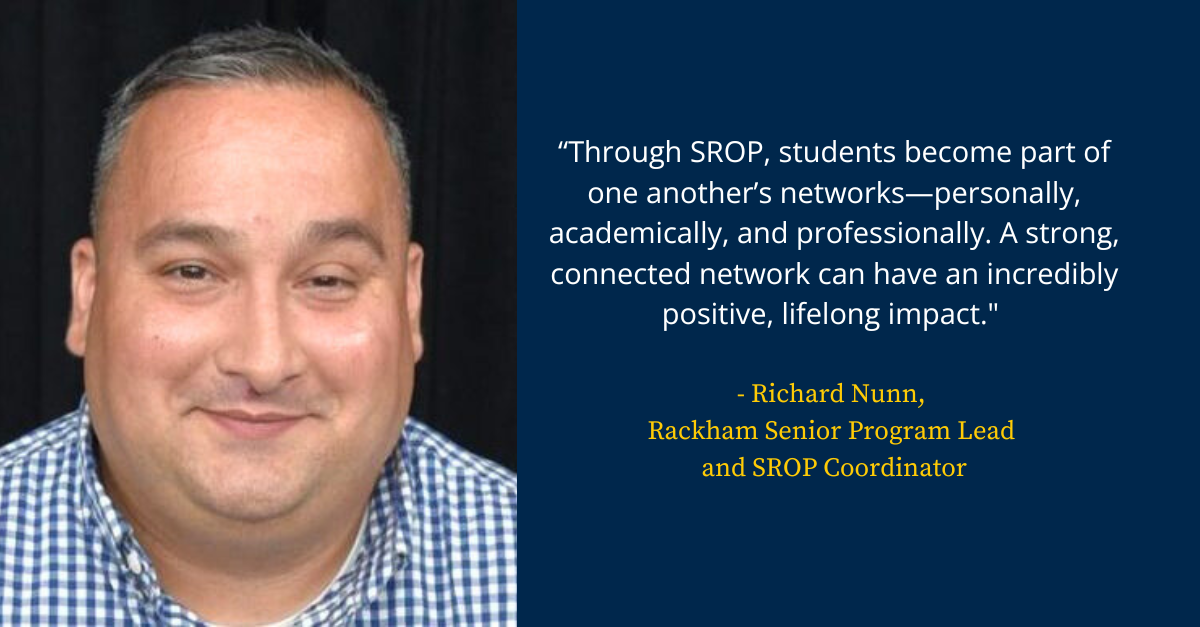Each summer, the University of Michigan Summer Research Opportunity Program (SROP) hosts undergraduate students on the U-M campus for 10 weeks. In addition to working on a research project with U-M faculty and graduate students, SROP participants enjoy professional development workshops and opportunities to build their scholarly networks with peers and with current graduate students.
In this Q&A, Richard Nunn, senior program lead and SROP coordinator, shares his thoughts on the program’s greatest impacts, needs, and vision.
What aspect of SROP has the greatest impact for students?
Richard Nunn: We recognize that in addition to coming to U-M to do research with faculty, students are coming here to be members of a supportive community of students who learn from each other. We have field trips, excursions, mentoring, coaching, and many individualized wraparound offerings to make sure everyone can connect in meaningful, inclusive ways.
When they leave the program, SROP alumni do more than keep in touch. They celebrate life milestones and birthdays together, they are roommates, and they help each other in stressful times. Through SROP, students become part of one another’s networks–personally, academically, and professionally. A strong, connected network can have an incredibly positive, lifelong impact.

Taking a broad view, how does SROP influence higher education and scholarly work?
Richard Nunn: We know that higher education as a broad field lacks diversity. SROP actively recruits students from a range of different backgrounds and introduces new voices into the academy. New voices ask different questions. They bring new experiences and knowledge to the table. We need their perspectives and inquiry at the graduate level.
Also, in the model we’re building, you don’t enter the SROP program and exit it. You become a part of it. This means that we have a strong alumni network of individuals who advocate for the program and for underserved students. They remember how SROP supported them when they were emerging scholars. They pay it forward.
What is your vision for the future of SROP?
Richard Nunn: Our program admits 40 to 50 students each summer and that’s not going to “fix” problems within higher education. Ultimately, I want to create a culturally relevant, culturally responsive summer research program that others can use as a model across the U.S.
One aspect of our program that I’d love to see more of nationally is year-round support. When SROP students leave Ann Arbor, they are supported by our staff throughout the academic year through coaching, mentoring, and workshops.
It’s also worth mentioning that we are committed to constant improvement and we are incredibly responsive to feedback from students. Our students’ needs are going to evolve–and our program will respond to those evolving needs.

Richard Nunn promotes the Rackham Graduate School’s offerings to support and cultivate a diverse campus community, including SROP, at the 2022 Biomedical Research Conference for Minoritized Scientists. Pictured, left to right: Rackham Ph.D. candidate Erick Aguinaldo, Rackham master’s students Joseph Mendoza Martinez and Stephany Mendez Ortega, and Richard Nunn.
What is SROP’s most pressing need?
Richard Nunn: We want to support SROP students in their research once they leave the U-M campus. Many SROP students continue working with faculty after the summer ends–and we want to support that. We want to fund students to present their SROP research at academic conferences and do other activities that would make them more competitive as they apply to graduate schools. Funding this emerging area of the program is our most pressing need.
Do you have a favorite memory from your time with SROP students?
Richard Nunn: My favorite part of the program overall is when students get to campus. Ann Arbor in the summertime is just really a great place to be. Students love seeing the Big House, the labs, and experiencing art fairs, festivals, and other happenings around town. It’s just a lot of fun.
Support SROP this Giving Tuesday and learn more about the experiences of SROP alums Janae Sayler and Caroline Lindey.

